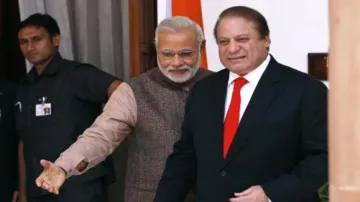Could Nawaz Sharif's recent praise of PM Modi be a pivotal moment for India-Pakistan relations?
In recent times, the Sharif family has been making efforts to reach out to India through positive declarations. Nevertheless, consecutive terrorist assaults could impede the incremental progress made by Pakistan.

New Delhi: A day following the swearing-in of the NDA government's council of ministers, former Pakistan Prime Minister Nawaz Sharif, a prominent figure leading Pakistan's ruling PML(N), extended an olive branch to Prime Minister Narendra Modi, acknowledging the BJP's recent electoral triumph as a testament to his leadership. In his message to PM Modi, Nawaz reiterated to replace "hate" with "hope" in order to fulfil the dreams of citizens. "Let us replace hate with hope and seize the opportunity to shape the destiny of the two billion people of South Asia," he conveyed on a social media platform.
Prime Minister Modi message to Pakistan
PM Modi swiftly reciprocated within two hours, reaffirming India's commitment to peace, security, and progress, with a subtle emphasis on countering terrorism as a paramount concern. Prime Minister Modi's message was clear: "Talks and terrorism cannot go together". PM Modi's reply was quite obvious amid the fact a Pakistan-sponsored terror group targetted a Hindu pilgrim bus at the time when he was swearing in for Prime Minister of India at Rashtrapati Bhavan, with heads of India's neighbouring nations, except Islamabad.
Earlier, Nawaz's younger brother and Pakistan's Prime Minister, Shehbaz Sharif, conveyed his congratulations to PM Modi via social media upon his assuming office. However, Shehbaz's congratulations seem just a part of diplomacy amid the fact he replied in the same "one-linear" format as PM Modi did when he became Prime Minister of Pakistan earlier in March this year. Although Modi graciously acknowledged the gesture, reminiscent of similar exchanges in the past between the two leaders.
Will Sharif's family positive gesture help in mending India-Pakistan ties?
Irrespective of Shehbaz's message, the recent outreach from the Sharif family marks a trend of positive overtures towards India. On May 30, Nawaz Sharif publicly acknowledged Pakistan's violation of the 1999 Lahore Declaration with India, a significant admission underscoring a shift in attitude. This was not the first time when Nawaz openly hailed India and took a dig at the Pakistan government for souring relations between the two South Asian nations. This admission was met with a constructive response from the Ministry of External Affairs, signalling a willingness to engage with Pakistan on such matters.
The change in government earlier in March, marked by the return of the Sharif family to power amidst a contentious election, raised hopes for renewed engagement between the two nations. Subsequently, on April 18, Maryam Nawaz, widely regarded as the Sharif family's political heir, delivered a conciliatory speech urging for improved ties during a gathering of Indian Sikh pilgrims at Kartarpur Sahib. Her speech, highlighting familial ties, shared heritage, and the potential for economic cooperation, was interpreted positively by New Delhi as a broader signal from the Pakistani establishment.
What lies ahead between India and Pakistan?
Despite the absence of formal diplomatic representation since 2019 and Pakistan's exclusion from recent swearing-in ceremonies in India, both countries have adhered to a ceasefire along the Line of Control since February 2021. These developments hint at a cautious yet hopeful trajectory towards potential dialogue and reconciliation between India and Pakistan.
Late last night, a paramilitary soldier lost his life in action, and a terrorist was neutralised during an encounter following an attack on a village in Kathua. The clashes, which commenced overnight in Jammu, have extended into the morning, encompassing an additional confrontation in Doda. In the initial exchange of fire in Doda, five soldiers and a special police officer (SPO) sustained injuries. Therefore, it can be concluded that recent attacks on Jammu and Kashmir's civilians may pose a threat to the positive vibes exchanged between the two neighbouring nations.
Also Read: PM Modi's swearing-in ceremony: Excluding Pakistan's PM Shehbaz Sharif from the frame